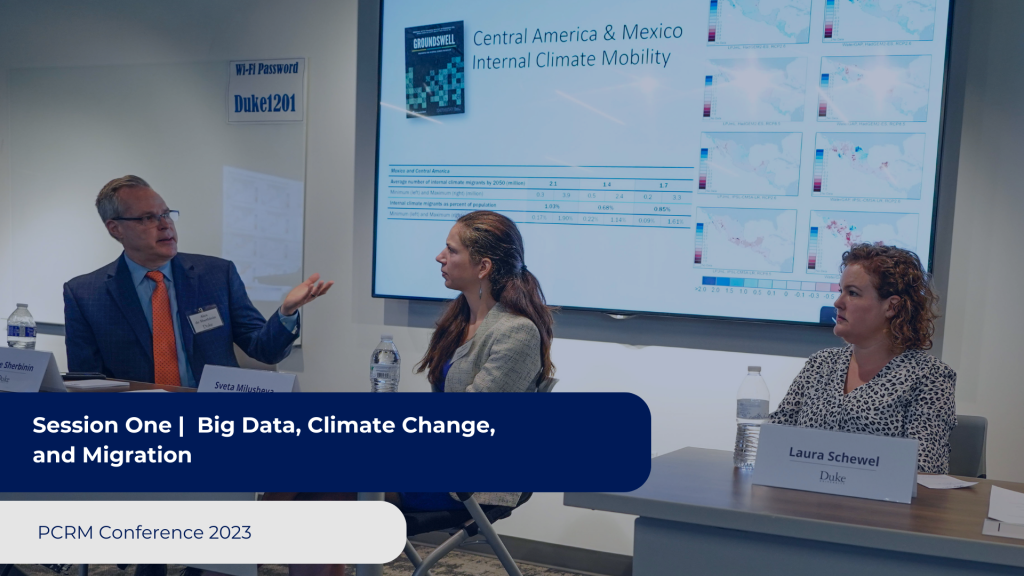Conference on Climate Change & Migration 2023


April 21, 2023
Conference on Climate Change & Migration
On April 21, 2023, Duke University’s Program on Climate, Resilience and Mobility (PCRM) hosted the Conference on Climate Change & Migration which aimed to bring together researchers, policymakers, sector experts, donors, NGOs, and other stakeholders to address the intersection between climate change and migration. This unique, day-long opportunity allowed experts to hear the latest on a range of topics that will influence the future of migration in the context of climate change.
WELCOME & INTRODUCTIONS

Sarah Bermeo
Co-Director, PCRM Associate Prof. of Public Policy and Political Science, Duke University

Kerilyn Schewel
Co-Director, PCRM Lecturing Fellow, Center for International Development, Duke University

Brian Murray
Interim Director, Nicholas Institute for Energy, Environment & Sustainability, Duke University
Session 1: Big Data, Climate Change, and Migration
Session one highlighted some of the diverse ways that researchers are currently using big data and other open data sources to analyze human mobility and its intersection with climate. Session presentations covered both the opportunities and challenges of using this type of data to inform both research and policy.

Sveta Milusheva
Economist, World Bank

Laura Schewel
CEO, Streetlight Data

Alex de Sherbinin
Deputy Director & Sr Research Scientist, CIESIN, Columbia Climate School

Kevin Horn
AAAS Science & Technology Policy Fellow, USAID

Brian McAdoo
Moderator Associate Prof. of Earth &Climate Sciences, NSOE, Duke University

Session 2: Climate Change & Internal Migration: Trends, Opportunities, and Challenges
Lorem ipsum dolor sit amet, consectetur adipiscing elit, sed do eiusmod tempor incididunt ut labore et dolore magna aliqua. Cursus turpis massa tincidunt dui ut ornare lectus sit. Feugiat vivamus at augue eget arcu dictum varius duis. Ut enim blandit volutpat maecenas volutpat blandit. Pharetra massa massa ultricies mi quis hendrerit. Blandit volutpat maecenas volutpat blandit aliquam etiam erat velit scelerisque. Ullamcorper malesuada proin libero nunc consequat interdum varius sit. Tristique senectus et netus et. Ut aliquam purus sit amet luctus venenatis. Magna fermentum iaculis eu non diam. Neque aliquam vestibulum morbi blandit cursus risus at.

David Cronin
Moderator Sr Policy & Legislative Specialist, Catholic Relief Services

Elizabeth Ferris
Director, Institute for the Study of Int. Migration, Georgetown University

Kanta Kumari Rigaud
Lead Climate Change Specialist, World Bank

David Leblang
Prof. of Politics and Public Policy, University of Virginia

Gabriela Nagle Alverio
Ph.D. Candidate in Environmental Policy (UPEP), Duke University

Erika Weinthal
Prof. of Environmental Policy and Public Policy, Duke University
Session 2: Climate Change & Internal Migration: Trends, Opportunities, and Challenges
Session two explored the complex issue of internal migration, both in the United Sates and globally. The panel discussed the difficulties of decision makers face when trying to create frameworks to tackle internal migration caused by climate change.

Elizabeth Ferris
Director, Institute for the Study of Int. Migration, Georgetown University

Kanta Kumari Rigaud
Lead Climate Change Specialist, World Bank

David Leblang
Prof. of Politics & Public Policy, University of Virginia

Gabriela Nagle Alverio
Ph.D. Candidate in Environmental Policy (UPEP), Duke University

Erika Weinthal
Prof. of Environmental Policy & Public Policy, Duke University

David Cronin
Moderator Sr Policy & Legislative Specialist, Catholic Relief Services

Keynote Address:
Keynote speaker Caglar Ozden discussed the overall landscape of migration and global development, framing the broader discussion on climate and migration in the context of a critical and historic demographic inflection point. He presented several potential broad policy responses to shift thinking around migration. Caglar Ozden is the co-director of the World Bank’s 2023 World Development Report entitled, “Migrants, Refugees, and Societies.”
Watch the full presentation in the video below.

Çağlar Özden
Co-Director WDR 2023 & Lead Economist, World Bank
Session 3: Climate Adaptation: Needs, Funding, Measurement, and Strategies
Lorem ipsum dolor sit amet, consectetur adipiscing elit, sed do eiusmod tempor incididunt ut labore et dolore magna aliqua. Cursus turpis massa tincidunt dui ut ornare lectus sit. Feugiat vivamus at augue eget arcu dictum varius duis. Ut enim blandit volutpat maecenas volutpat blandit. Pharetra massa massa ultricies mi quis hendrerit. Blandit volutpat maecenas volutpat blandit aliquam etiam erat velit scelerisque. Ullamcorper malesuada proin libero nunc consequat interdum varius sit. Tristique senectus et netus et. Ut aliquam purus sit amet luctus venenatis. Magna fermentum iaculis eu non diam. Neque aliquam vestibulum morbi blandit cursus risus at.

Sarah Bermeo
Co-Director, PCRM Associate Prof. of Public Policy and Political Science, Duke University

Dakota Fisher
Community Planner, FEMA

Lawrence Huang
Associate Policy Analyst, Migration Policy Institute

Limon B. Rodriquez
Doctoral Candidate, Johns Hopkins University School of Advanced International Studies

Irasema Infante Barbosa
Moderator Regional Coordinator, Inter-American Development Bank

Session 4: International Climate Migration: Law, Human Rights, and Challenges
Lorem ipsum dolor sit amet, consectetur adipiscing elit, sed do eiusmod tempor incididunt ut labore et dolore magna aliqua. Cursus turpis massa tincidunt dui ut ornare lectus sit. Feugiat vivamus at augue eget arcu dictum varius duis. Ut enim blandit volutpat maecenas volutpat blandit. Pharetra massa massa ultricies mi quis hendrerit. Blandit volutpat maecenas volutpat blandit aliquam etiam erat velit scelerisque. Ullamcorper malesuada proin libero nunc consequat interdum varius sit. Tristique senectus et netus et. Ut aliquam purus sit amet luctus venenatis. Magna fermentum iaculis eu non diam. Neque aliquam vestibulum morbi blandit cursus risus at.

Elizabeth Keyes
Professor of Law, University of Baltimore

Kerilyn Schewel
Co-Director, PCRM Lecturing Fellow, Center for International Development, Duke University

Rachel Schmidtke
Latin America Senior Advocate, Refugees International

Theresa Cardinal Brown
Senior Advisor, Immigration and Border Policy, Bipartisan Policy Center

Dara Lind
Moderator Senior Fellow, American Immigration Council











